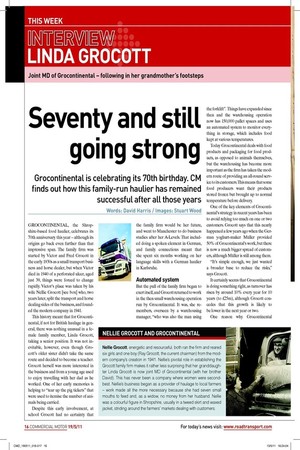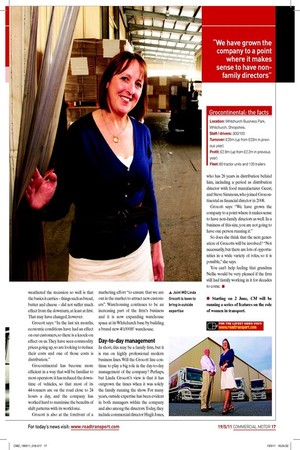Seventy and still going strong
Page 10

Page 11

If you've noticed an error in this article please click here to report it so we can fix it.
Grocontinental is celebrating its 70th birthday. CM finds out how this family-run haulier has remained successful after all those years
Words: David Harris / Images: Stuart Wood
GROCONTINENTAL, the Shropshire-based food haulier, celebrates its 70th anniversary this year – although its origins go back even further than that impressive span. The family firm was started by Victor and Fred Grocott in the early 1930s as a small transport business and horse dealer, but when Victor died in 1940 of a perforated ulcer, aged just 39, things were forced to change rapidly. Victor’s place was taken by his wife Nellie Grocott [see box] who, two years later, split the transport and horse dealing sides of the business, and founded the modern company in 1941.
This history meant that for Grocontinental, if not for British haulage in general, there was nothing unusual in a female family member, Linda Grocott, taking a senior position. It was not inevitable, however, even though Grocott’s older sister didn’t take the same route and decided to become a teacher. Grocott herself was more interested in the business and from a young age used to enjoy travelling with her dad as he worked. One of her early memories is helping to “tear up the pig tickets” that were used to itemise the number of animals being carried.
Despite this early involvement, at school Grocott had no certainty that the family firm would be her future, and went to Manchester to do business studies after her A-Levels. That included doing a spoken element in German, and family connections meant that she spent six months working on her language skills with a German haulier in Karlsruhe.
Automated system
But the pull of the family firm began to exert itself, and Grocott returned to work in the then small warehousing operation run by Grocontinental. It was, she remembers, overseen by a warehousing manager, “who was also the man using the forklift” . Things have expanded since then and the warehousing operation now has 150,000 pallet spaces and uses an automated system to monitor everything in storage, which includes food kept at various temperatures.
Today Grocontinental deals with food products and packaging for food products, as opposed to animals themselves, but the warehousing has become more important as the firm has taken the modern route of providing an all-round service to its customers. This means that some food producers want their products stored frozen but brought up to normal temperature before delivery.
One of the key elements of Grocontinental’s strategy in recent years has been to avoid relying too much on one or two customers. Grocott says that this nearly happened a few years ago when the German yoghurt-maker Müller provided 50% of Grocontinental’s work, but there is now a much bigger spread of customers, although Müller is still among them.
“It’s simple enough, we just wanted a broader base to reduce the risks,” says Grocott.
It certainly seems that Grocontinental is doing something right, as turnover has risen by around 10% every year for 10 years (to £25m), although Grocott concedes that this growth is likely to be lower in the next year or two.
One reason why Grocontinental weathered the recession so well is that the basics it carries – things such as bread, butter and cheese – did not suffer much effect from the downturn, at least at first. That may have changed, however.
Grocott says: “In the last six months, economic conditions have had an effect on our customers, so there is a knock-on effect on us. They have seen commodity prices going up, so are looking to reduce their costs and one of those costs is distribution.” Grocontinental has become more efficient in a way that will be familiar to most operators: it has reduced the downtime of vehicles, so that most of its 44-tonners are on the road close to 24 hours a day, and the company has worked hard to maximise the benefits of shift patterns with its workforce.
Grocott is also at the forefront of a marketing effort “to ensure that we are out in the market to attract new customers” . Warehousing continues to be an increasing part of the firm’s business and it is now expanding warehouse space at its Whitchurch base by building a brand new 40,000ft2 warehouse.
Day-to-day management
In short, this may be a family firm, but it is run on highly professional modern business lines. Will the Grocott line continue to play a big role in the day-to-day management of the company? Perhaps, but Linda Grocott’s view is that it has outgrown the times when it was solely the family running the show. For many years, outside expertise has been evident in both managers within the company and also among the directors. Today, they include commercial director Hugh Jones, who has 26 years in distribution behind him, including a period as distribution director with food manufacturer Geest; and Steve Simmons, who joined Grocontinental as financial director in 2008.
Grocott says: “We have grown the company to a point where it makes sense to have non-family directors as well. In a business of this size, you are not going to have one person running it.” So does she think that the next generation of Grocotts will be involved? “Not necessarily, but there are lots of opportunities in a wide variety of roles, so it is possible,” she says.
You can’t help feeling that grandma Nellie would be very pleased if the firm still had family working in it for decades to come. ■ ● Starting on 2 June, CM will be running a series of features on the role of women in transport.









































